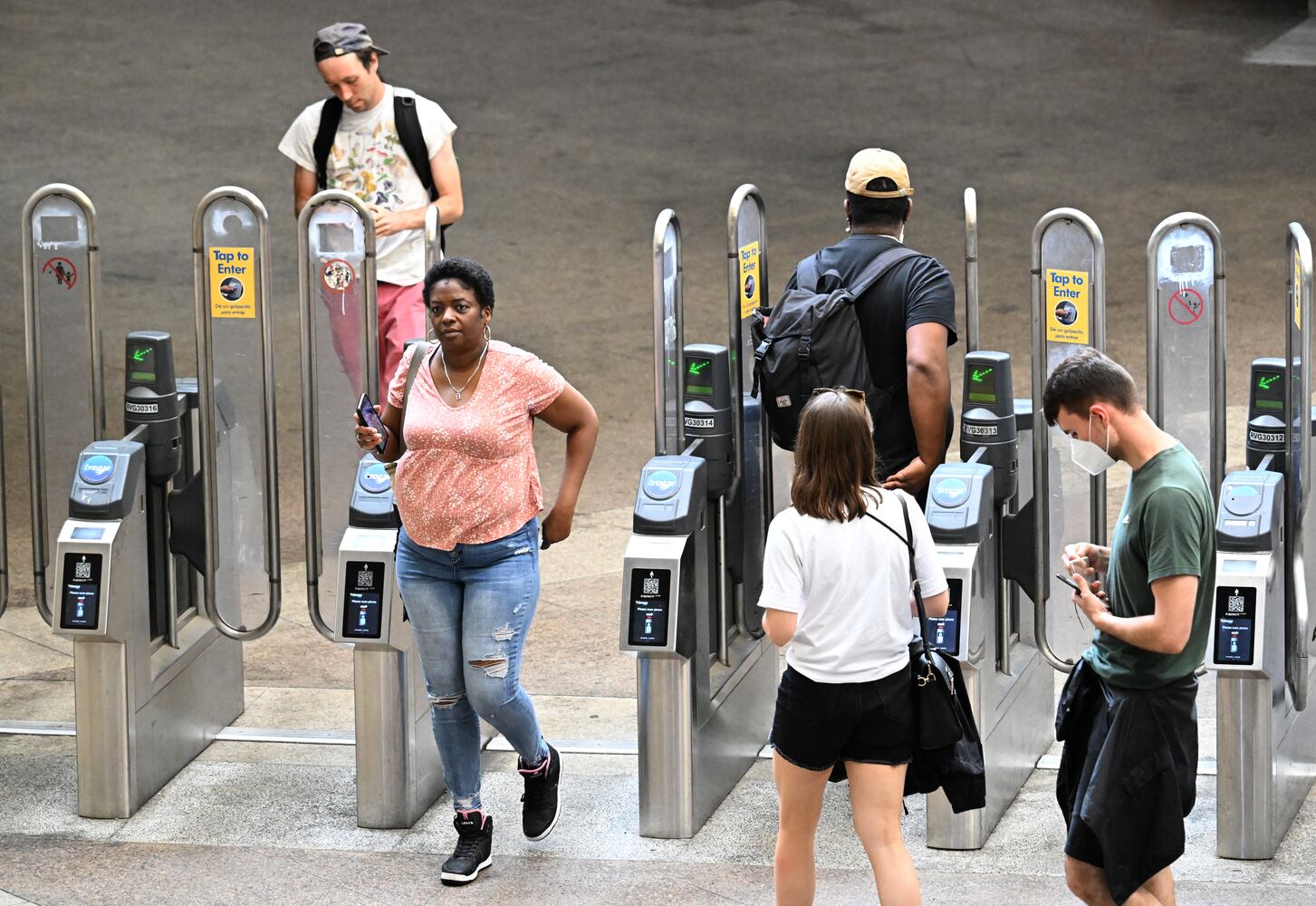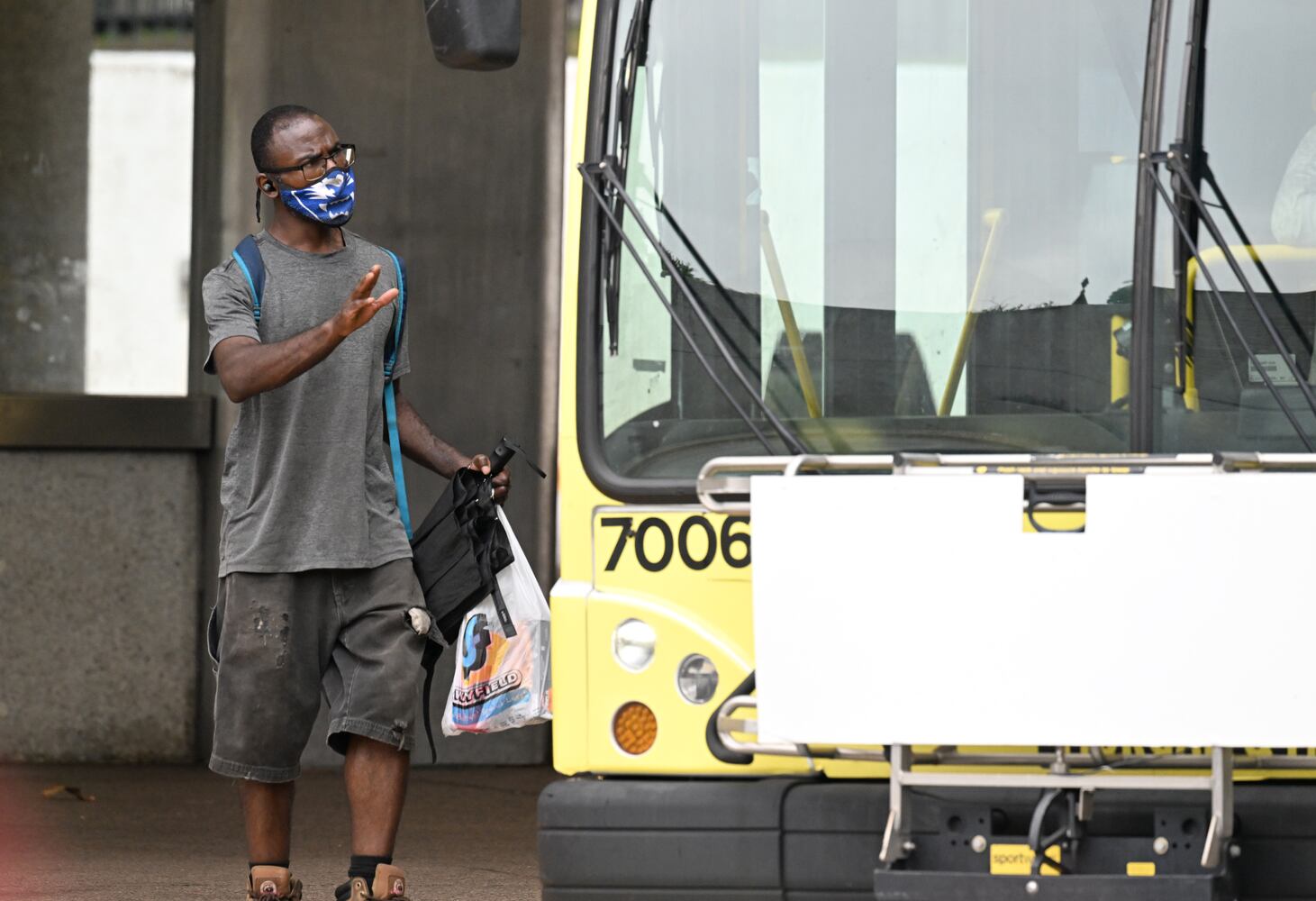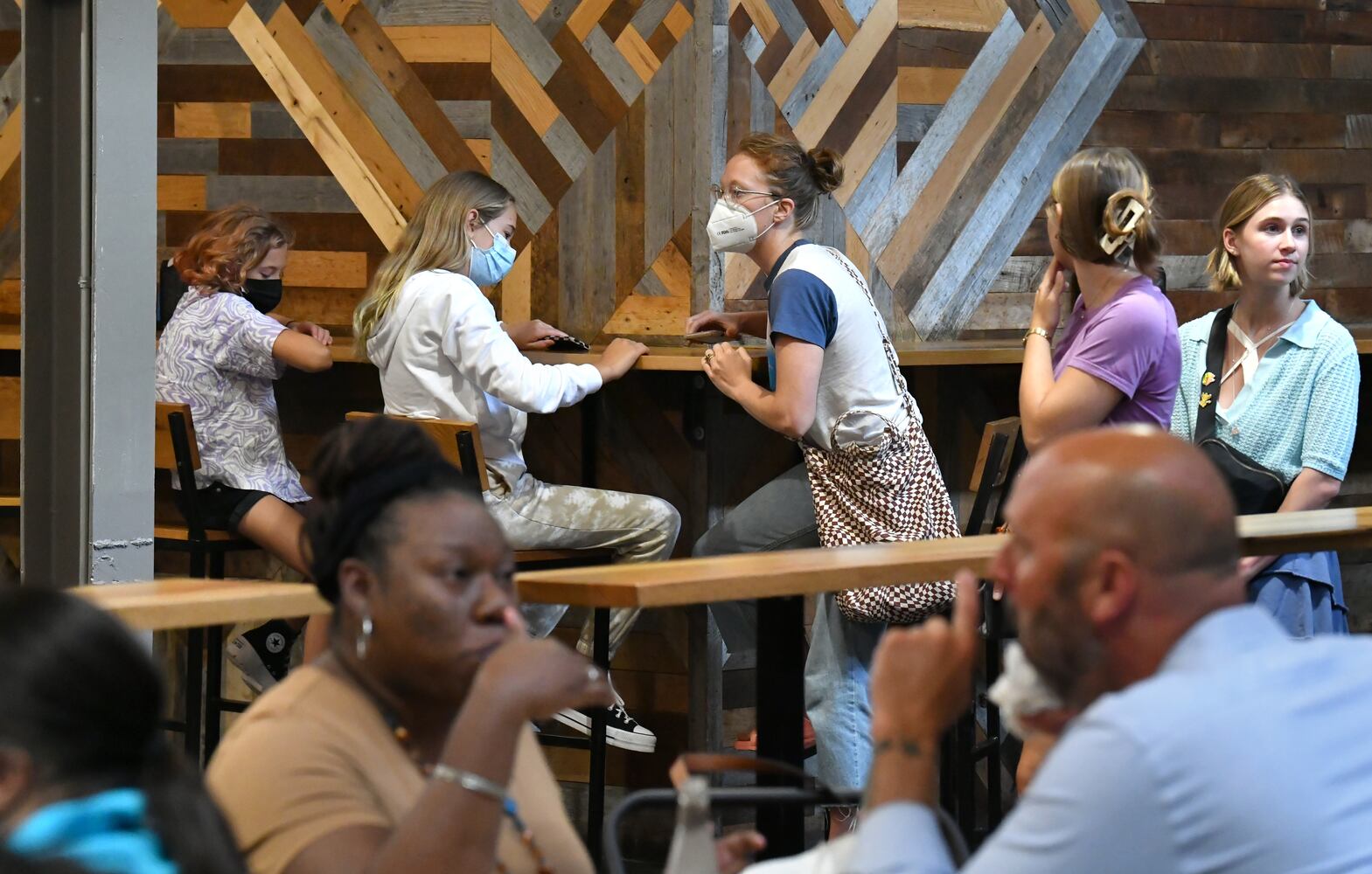Here we go again.
A new strain of the coronavirus is driving a fresh surge of cases in Georgia, with much of the state and all of metro Atlanta experiencing high levels of COVID-19, according to federal data. COVID hospitalizations in Georgia are also on the rise, more than triple the number since spring, with emergency rooms overflowing again.
But this time, more than just the strain of the virus is new.
For the first time, a COVID-19 surge is meeting a post-pandemic attitude.
Three months into the rising case numbers, summer gatherings swirl, with little talk of caution. The federal mask mandate is gone. Packed airplanes fly with barely a passenger masked, even as airlines cancel flights citing staff sick with COVID as part of the reason. Meanwhile, the surge itself is different from any previous surge: rising slowly but inexorably with no plateau in sight since it began in mid-April.
Dr. Daniel Wu, interim head of emergency services at Grady Memorial Hospital, said Tuesday morning that Grady had 90 patients in its emergency room who were “boarding,” or waiting for a bed inside the hospital to open up.
Credit: Natrice Miller / Natrice.Miller@ajc.com
Credit: Natrice Miller / Natrice.Miller@ajc.com
“I hope this is not the new normal,” Wu said. “I mean, this would be very difficult for us to maintain long-term.”
Wu said most COVID patients now are coming in for something besides COVID and then being diagnosed with the virus. In many cases, he said COVID may have triggered the initial condition, like with chronic lung disease, or when a COVID-related oxygen shortage causes a patient to faint, fall and injure themselves.
Federal officials acknowledged the new variant’s quick spread in a recent briefing but didn’t discourage normal summertime activities.
“We should not let it disrupt our lives,” said Dr. Anthony Fauci, chief medical advisor to President Biden. “But we cannot deny that it is a reality that we need to deal with.” Fauci and his teammates urged continuing use of vaccine booster shots, voluntary masking, and for those who get infected, antiviral medications.
About this latest wave, said Dr. Andrew Reisman, a Gainesville doctor and former president of the Medical Association of Georgia, said, “I think this will be routine.”
He said he expects each new variant to be more contagious but in general cause less severe disease than earlier iterations. But that’s not to say he’s taking it lightly. He said he still continues to wear his masks in public indoor settings including airports and grocery stores.
Credit: Chris Day
Credit: Chris Day
Virus spread in Georgia
The signs of a surge — the first one since the winter holidays’ omicron surge abated — are clear.
Case counts have been climbing for weeks in spite of the fact that home testing became widely available this year, driving down the numbers of lab tests available to detect a rise. The current number of cases is approaching the peak number from the first-ever coronavirus surge in summer 2020. The 7-day average of newly confirmed COVID cases daily was 2,728 as of July 13, the most recent data available from DPH. Experts say the true number of new infections is likely much higher.
Out of Georgia’s 159 counties, 86 are classified as having high community levels of COVID-19, with most others at medium levels, according to the Centers for Disease Control and Prevention’s COVID Data Tracker, which is based on hospital capacity, COVID-19 hospital admissions, and the total number of new COVID-19 cases in an area. Only 15 counties in Georgia show low community levels.
Credit: CDC
Credit: CDC
Wastewater surveillance, which measures the amount of coronavirus-laced genetic material shed from infected residents, is also showing a rise in cases. The rise in coronavirus levels detected in sewer water over a recent 15-day period is at least 100% in Cobb, DeKalb and Newton counties. In Gwinnett, the increase has surpassed 1,000%, according to the CDC’s tracking program.
This latest wave is putting stress on hospital systems already struggling with staffing issues. COVID hospitalizations surpassed 1,200 for the state on Monday. That is a small percentage of the overall hospital beds available in the state, but large hospitals generally run full or nearly full at the best of times, making any added burden a recipe for trouble.
Emory Healthcare Chief Nurse Executive Sharon Pappas said part of the issue for all hospitals is the worker shortage. The hospitals have beds that could hold patients but must remain closed because there aren’t enough nurses.
On Tuesday, all Emory hospitals from south to north were boarding patients in their emergency rooms who were waiting for admission to the hospital, Pappas said. “That is not typical,” she said.
As of Monday, all three full-service adult hospitals in DeKalb County — Emory University Hospital, Emory Decatur and Emory Hillandale — were reporting “severe” overcrowding and telling ambulances not to bring new patients to their emergency rooms. The same was true for Fulton County’s two downtown Atlanta hospitals, Grady Memorial Hospital and Wellstar Atlanta Medical Center, and on and off for other hospitals north of there.
Eva Lee, a nationally known pandemic researcher in Atlanta, said both urban and rural counties are seeing spikes in hospitalizations related to COVID. The number of deaths has been on the rise since June.
The fact that COVID is also spreading in less populous places, she said, suggests that the people are gathering at events and small parties where the virus can thrive. “This is not the flu, it is not a cold, so we should be careful. Not afraid, but careful,” she said.
Mask guidelines changing
The federal guidance on masking remains the same since the CDC first launched the community transmission tracker in February: the CDC recommends that everyone wear masks in indoor public spaces in high transmission areas. But so far, few local governments have brought back masking requirements.
In metro Atlanta, Gwinnett and Cobb counties have both taken steps this month to re-institute indoor masking in some public buildings. DeKalb County enacted a mask-wearing ordinance in July 2020 and has not yet rescinded it, still requiring masking in county buildings and public places.
Meanwhile, with high rates of transmission here locally, the Transportation Security Administration has reinstated mask requirements for federal employees at Hartsfield-Jackson International Airport, according to a TSA spokesman.
Gwinnett County is now mandating that all employees wear face masks while inside county buildings, and is “strongly encouraging” visitors to wear them, as hospital bed usage, hospital admissions and the total new coronavirus caseload is high. Mask requirements for visitors inside courtrooms will be at the discretion of the presiding judge.
Nicole Hendrickson, the chairwoman for the Gwinnett County Board of Commissioners, said the safety of their employees is a top priority, and that it’s possible education leaders in the county could also revisit the masking policy in schools ahead of the new school year.
“We have to be responsible to our workforce and ensure that we can continue offering services, because as a county government, we cannot shut down,” she said.
While it’s well known that COVID vaccines are no longer able to prevent most infections, health experts say they are still effective at preventing severe illness and death against the BA.5 omicron subvariant, which is now the most prevalent coronavirus strain in Georgia and the U.S. In addition, vaccine makers are working on updated shots that target new forms of the omicron variant.
Such measures are important, Wu said.
“The word that always comes up whenever you’re talking to healthcare workers is, ‘tired.’ Fatigued. People are tired,” he said.
“So I don’t want this to be the new normal. I don’t even want this to be the trend.”
― Staff writer Kelly Yamanouchi contributed to this article.
The Latest
Featured







